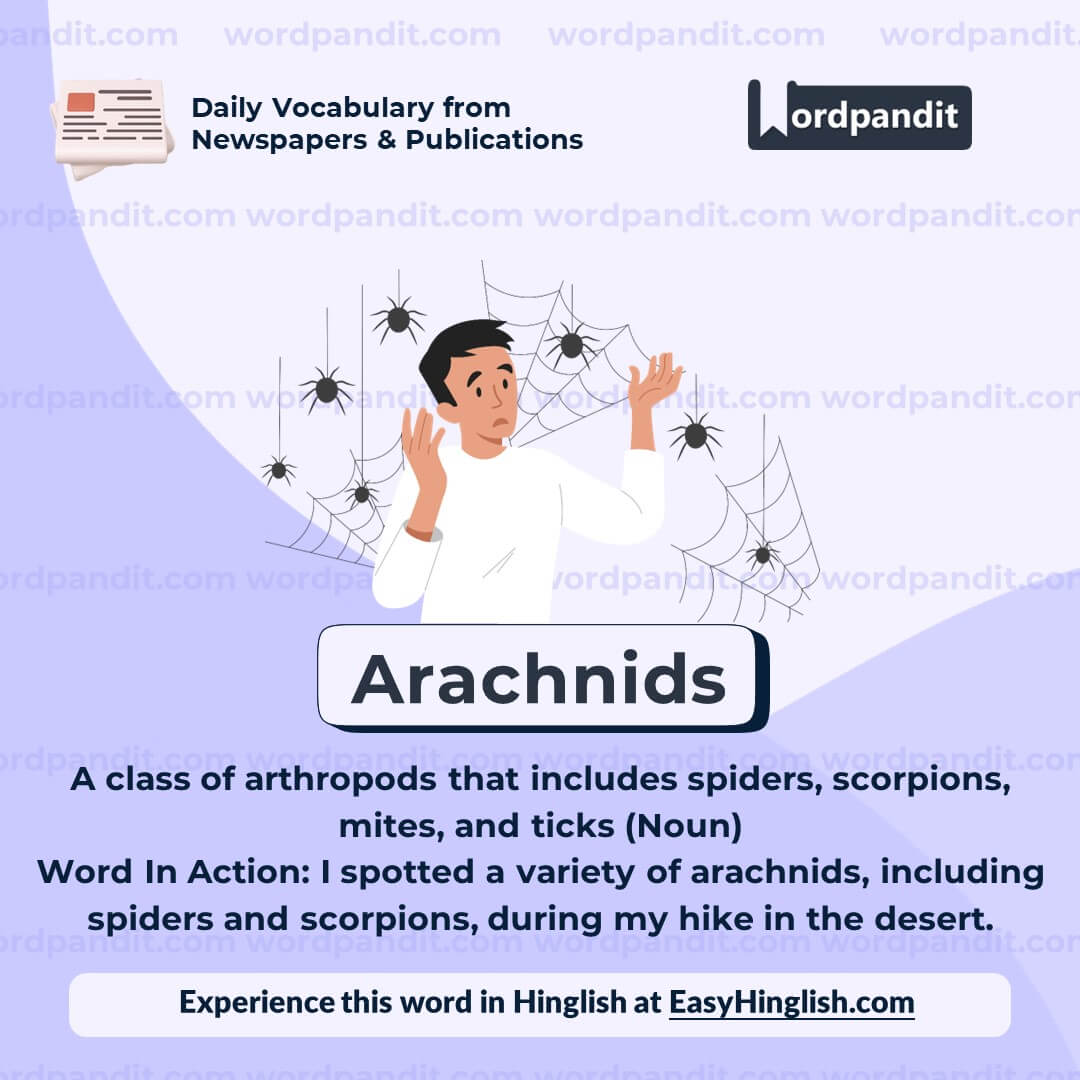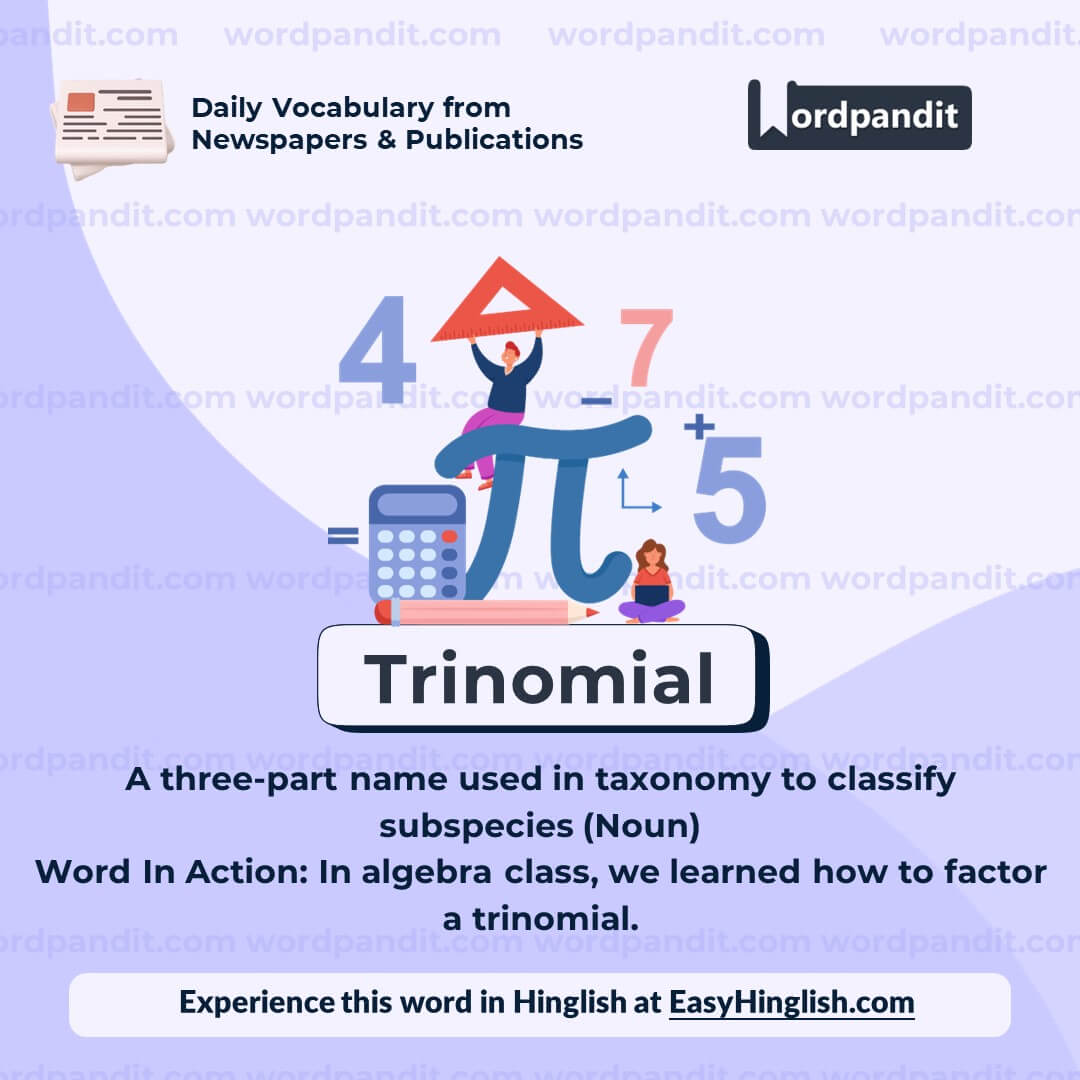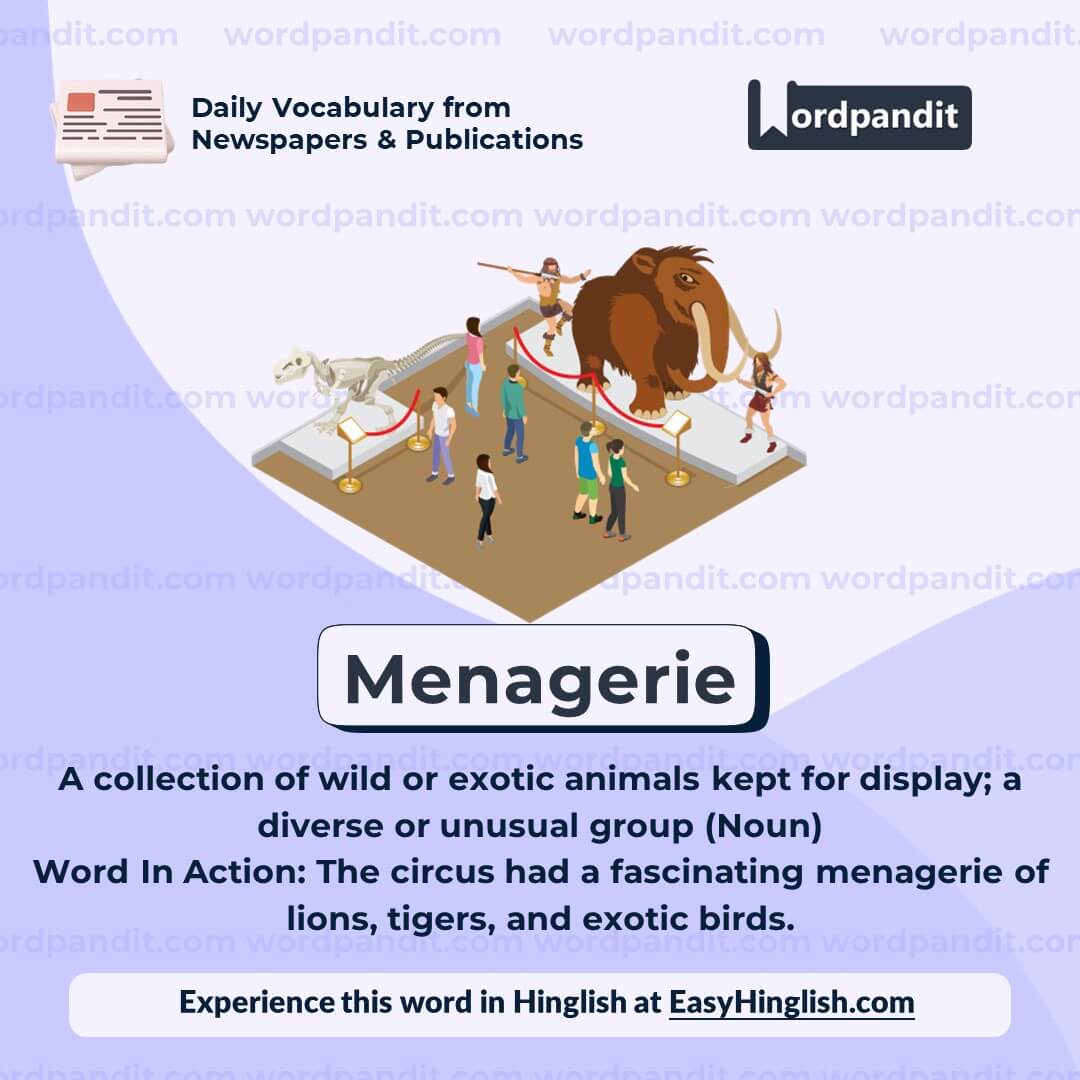Daily Vocabulary from International Newspapers and Publications
Expand Your Vocabulary with Wordpandit’s Global Vocabulary Hub
At Wordpandit, we are committed to helping you develop a truly global vocabulary by drawing from some of the most respected international publications. This section is designed to keep you ahead of the curve by introducing you to words that define global conversations and trends.
The Power of Global Sources
To help you think and communicate on a global scale, we curate vocabulary from renowned international sources, such as:
- The New York Times
- The Washington Post
- BBC
- The Guardian
- The Economist
- Scientific American
- Psychology Today
- And many more...
Stay Global, Stay Competitive
Our daily updates from international publications ensure you are consistently exposed to new words that reflect global news and developments, making sure your vocabulary is not only current but also globally relevant.
Enhance Your Global Perspective
Whether you’re preparing for international exams, aiming to excel in global business communication, or want to enhance your language skills for personal growth, Wordpandit offers the resources you need to thrive in a global context.
Effective Learning, Global Reach
Our learning methodology combines global examples, memory aids, and interactive activities, allowing you to internalize new words effectively and apply them in real-world scenarios.
Begin Your Global Vocabulary Journey Now!
Why Choose Wordpandit?
Practical Learning: Focus on words you'll actually encounter in real-world reading, enhancing your comprehension and communication skills.
Diverse Content: From current affairs to scientific breakthroughs, our varied sources expose you to vocabulary across multiple domains.
Effortless Integration: Make Wordpandit a part of your daily routine. Just a few minutes each day can significantly boost your lexicon over time.
Your Path to Vocabulary Mastery
- Visit our Daily Vocabulary section regularly
- Explore new words and their usage in context
- Practice incorporating these words into your own writing and speech
- Track your progress as your vocabulary expands
Start Your Journey Today
Embark on your vocabulary enhancement journey with Wordpandit. By consistently engaging with our daily posts, you'll build a robust vocabulary that serves you well in academic, professional, and personal contexts.
Remember, a word a day keeps linguistic limitations at bay. Make Wordpandit your daily companion in the quest for vocabulary excellence!
WORD-1: Arachnids
Context:
"If he had factored in the insects and arachnids, his Ark would soon have been foundering under the weight of about 1.1 million different species." - Aeon
Explanatory Paragraph:
Arachnids are a class of joint-legged invertebrates that include spiders, scorpions, mites, and ticks. Unlike insects, they have eight legs instead of six and do not have antennae. Arachnids play crucial roles in ecosystems, often serving as predators that help control insect populations.
Meaning: A class of arthropods that includes spiders, scorpions, mites, and ticks. (Noun)
Pronunciation: uh-RAK-nidz
Difficulty Level: ⭐⭐⭐ Intermediate
Etymology: Derived from Greek "aráchnē," meaning "spider," in reference to the most well-known members of this group.
Synonyms & Antonyms:
Synonyms: Spiders, scorpions, mites, ticks
Antonyms: Insects, crustaceans (other arthropods)
Usage Examples:
- The dense rainforest is home to many species of arachnids, including venomous scorpions and large tarantulas.
- Unlike insects, arachnids have no antennae and rely on specialized hairs to sense their surroundings.
- Scientists studying arachnids have discovered new species of spiders in the caves of South America.
- Her fear of arachnids made her hesitant to go on a camping trip in the woods.
Cultural Reference:
"The mythical figure Arachne from Greek mythology was transformed into a spider by the goddess Athena, giving rise to the name ‘arachnids’ for these creatures." - Greek Mythology
Think About It:
Why do you think so many people have an innate fear of arachnids, even though most of them are harmless?
Quick Activity:
Research three different types of arachnids and write one interesting fact about each.
Memory Tip:
Remember "arachnids" by thinking of the word "arachnophobia," the fear of spiders—one of the most well-known members of this class.
Real-World Application:
Understanding arachnids is essential in pest control, medicine (as some spider venom is used in research), and conservation efforts to protect these crucial predators in the ecosystem.
WORD-2: Trinomial
Context:
"The trinomial – the subspecies, described by a Latin name that adds a third classifying component, as in, say, Passer domesticus biblicus, the Palestine house sparrow – further inflates Noah’s hypothetical menagerie." - Aeon
Explanatory Paragraph:
A trinomial is a term used in taxonomy to describe the scientific naming of a subspecies. While most species are identified with a binomial name (genus + species), a trinomial name includes a third component that specifies the subspecies. This system helps scientists classify and differentiate variations within a species.
Meaning: A three-part name used in taxonomy to classify subspecies. (Noun)
Pronunciation: try-NO-mee-uhl
Difficulty Level: ⭐⭐⭐ Intermediate
Etymology: Derived from Latin "tri-" (three) and "nomialis" (relating to names), indicating a three-part naming system.
Synonyms & Antonyms:
Synonyms: Subspecies name, scientific classification, taxonomic term
Antonyms: Common name, generic name
Usage Examples:
- The trinomial system allows scientists to differentiate between regional variations of the same species.
- While the wolf is classified as Canis lupus, its trinomial name Canis lupus arctos refers specifically to the Arctic wolf.
- Students studying zoology learn how trinomial nomenclature helps organize biological diversity.
- Some bird species have multiple trinomial names due to variations in different geographic regions.
Cultural Reference:
"Carl Linnaeus, the father of modern taxonomy, developed the binomial nomenclature system, which later expanded into trinomial nomenclature for classifying subspecies." - History of Science
Think About It:
How does the trinomial system help scientists understand biodiversity and evolutionary relationships?
Quick Activity:
Find three examples of trinomial names in zoology or botany and write their common names.
Memory Tip:
Think of "tri-" meaning three and "nomial" related to names—trinomial simply means "three names" in scientific classification.
Real-World Application:
Trinomial nomenclature is widely used in conservation efforts, helping biologists identify and protect endangered subspecies with precision.
WORD-3: Inflate
Context:
"The trinomial – the subspecies, described by a Latin name that adds a third classifying component, as in, say, Passer domesticus biblicus, the Palestine house sparrow – further inflates Noah’s hypothetical menagerie." - Aeon
Explanatory Paragraph:
The word "inflate" means to fill something with air or gas so that it expands, but it can also mean to increase something beyond its normal size, often in an exaggerated or artificial way. In a figurative sense, it can refer to making numbers, claims, or importance seem larger than they actually are.
Meaning: To fill with air or gas; to increase beyond normal or realistic limits. (Verb)
Pronunciation: in-FLAYT
Difficulty Level: ⭐⭐ Beginner
Etymology: From Latin "inflatus," past participle of "inflare," meaning "to blow into," formed from "in-" (into) + "flare" (to blow).
Synonyms & Antonyms:
Synonyms: Expand, swell, enlarge, exaggerate, amplify
Antonyms: Deflate, shrink, diminish, reduce, downplay
Usage Examples:
- He used a pump to inflate the bicycle tires before going for a ride.
- Many companies inflate their prices during peak seasons to maximize profits.
- The politician was accused of inflating his achievements to gain more votes.
- As the balloon continued to inflate, it became dangerously close to bursting.
Cultural Reference:
"During the financial crisis, some businesses were caught inflating their earnings to appear more successful than they actually were." - Economic History Journal
Think About It:
Why do you think people tend to inflate their achievements or successes in social or professional settings?
Quick Activity:
Write a sentence using "inflate" in both its literal and figurative meanings.
Memory Tip:
Think of a balloon: when you **inflate** it, it gets bigger. Similarly, when someone inflates a fact, they make it seem bigger than it really is.
Real-World Application:
Understanding "inflate" is useful in discussions about economics (inflated prices), storytelling (inflated claims), and even everyday situations like inflating a car tire or a life vest.
WORD-4: Hypothetical
Context:
"The trinomial – the subspecies, described by a Latin name that adds a third classifying component, as in, say, Passer domesticus biblicus, the Palestine house sparrow – further inflates Noah’s hypothetical menagerie." - Aeon
Explanatory Paragraph:
The word "hypothetical" refers to something that is based on an assumption or an imagined scenario rather than on actual facts or evidence. It is often used in academic discussions, experiments, and debates to explore possible outcomes or ideas without necessarily proving them to be true.
Meaning: Based on a possible situation or an assumption rather than reality. (Adjective)
Pronunciation: hy-puh-THET-ih-kuhl
Difficulty Level: ⭐⭐⭐ Intermediate
Etymology: Derived from Greek "hypothetikos," meaning "pertaining to a hypothesis," from "hypothesis" (a proposed explanation).
Synonyms & Antonyms:
Synonyms: Theoretical, assumed, supposed, speculative, conjectural
Antonyms: Real, factual, actual, proven, certain
Usage Examples:
- The scientist proposed a hypothetical scenario where climate change could be reversed in 50 years.
- During the debate, she presented a hypothetical case to illustrate her point.
- Many science fiction novels are based on hypothetical technologies that do not yet exist.
- The professor asked a hypothetical question: "What if gravity suddenly stopped working?"
Cultural Reference:
"Albert Einstein often used hypothetical thought experiments, such as imagining traveling at the speed of light, to develop his theories of relativity." - History of Science
Think About It:
If you could create a hypothetical invention to improve the world, what would it be and why?
Quick Activity:
Write a hypothetical situation where humans discover an unknown planet and describe how life might exist there.
Memory Tip:
Think of "hypothesis" (a possible explanation) and "hypothetical" as something that is **not real yet**, but **could be possible**.
Real-World Application:
Understanding "hypothetical" helps in fields like science, law, and business, where possible scenarios and assumptions are used for research, planning, and decision-making.
WORD-5: Menagerie
Context:
"The trinomial – the subspecies, described by a Latin name that adds a third classifying component, as in, say, Passer domesticus biblicus, the Palestine house sparrow – further inflates Noah’s hypothetical menagerie." - Aeon
Explanatory Paragraph:
The word "menagerie" originally referred to a collection of wild or exotic animals kept for display. Over time, its meaning has expanded to describe any diverse or unusual collection, whether of people, things, or ideas. In the context of Noah’s menagerie, it suggests an extensive and varied collection of animals gathered on the ark.
Meaning: A collection of wild or exotic animals kept for display; a diverse or unusual group. (Noun)
Pronunciation: muh-NAJ-uh-ree
Difficulty Level: ⭐⭐⭐ Intermediate
Etymology: From French "ménagerie," meaning "management of a household or farm," later evolving to refer to the care of animals.
Synonyms & Antonyms:
Synonyms: Zoo, collection, assortment, array, hodgepodge
Antonyms: Order, uniformity, singularity
Usage Examples:
- The traveling circus featured a menagerie of exotic animals, including lions, elephants, and zebras.
- Her apartment was a menagerie of quirky furniture and unusual decorations.
- The author’s latest novel introduces a menagerie of eccentric characters from different backgrounds.
- The scientist’s lab was filled with a menagerie of beakers, test tubes, and experimental plants.
Cultural Reference:
"The Glass Menagerie," a famous play by Tennessee Williams, uses the word metaphorically to represent fragile dreams and illusions." - American Literature
Think About It:
If you could create your own menagerie, what unusual or interesting things would you include?
Quick Activity:
Write a short paragraph using "menagerie" in a figurative sense, such as describing a chaotic group of friends or a collection of unusual objects.
Memory Tip:
Think of a **zoo**—a menagerie is like a collection of diverse or unusual things, just like a zoo has many different animals.
Real-World Application:
"Menagerie" is useful for describing anything that is diverse, chaotic, or varied, whether it's a collection of pets, books, ideas, or even people at a party.

















